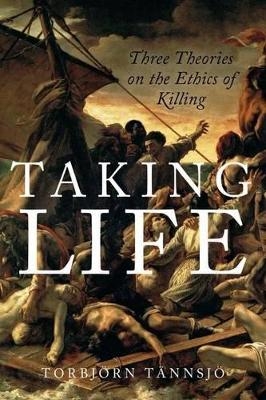
Taking Life
Three Theories on the Ethics of Killing
Seiten
2015
Oxford University Press Inc (Verlag)
978-0-19-022558-2 (ISBN)
Oxford University Press Inc (Verlag)
978-0-19-022558-2 (ISBN)
When is it right to kill? Three ethical theories are examined, deontology, a moral rights theory, and utilitarianism. The implications of each theory are worked out for different kinds of killing. In the final analysis, utilitarianism can best account for our considered intuitions about these kinds of killing.
When and why is it right to kill? When and why is it wrong? Torbjörn Tännsjö examines three theories on the ethics of killing in this book: deontology, a libertarian moral rights theory, and utilitarianism. The implications of each theory are worked out for different kinds of killing: trolley-cases, murder, capital punishment, suicide, assisted death, abortion, killing in war, and the killing of animals. These implications are confronted with our intuitions in relation to them, and our moral intuitions are examined in turn. Only those intuitions that survive an understanding of how we have come to hold them are seen as 'considered' intuitions. The idea is that the theory that can best explain the content of our considered intuitions gains inductive support from them. We must transcend our narrow cultural horizons and avoid certain cognitive mistakes in order to hold considered intuitions. In this volume, suitable for courses in ethics and applied ethics, Tännsjö argues that in the final analysis utilitarianism can best account for, and explain, our considered intuitions about all these kinds of killing.
When and why is it right to kill? When and why is it wrong? Torbjörn Tännsjö examines three theories on the ethics of killing in this book: deontology, a libertarian moral rights theory, and utilitarianism. The implications of each theory are worked out for different kinds of killing: trolley-cases, murder, capital punishment, suicide, assisted death, abortion, killing in war, and the killing of animals. These implications are confronted with our intuitions in relation to them, and our moral intuitions are examined in turn. Only those intuitions that survive an understanding of how we have come to hold them are seen as 'considered' intuitions. The idea is that the theory that can best explain the content of our considered intuitions gains inductive support from them. We must transcend our narrow cultural horizons and avoid certain cognitive mistakes in order to hold considered intuitions. In this volume, suitable for courses in ethics and applied ethics, Tännsjö argues that in the final analysis utilitarianism can best account for, and explain, our considered intuitions about all these kinds of killing.
Torbjörn Tännsjö is Kristian Claëson Professor of Practical Philosophy at Stockholm University. He has published extensively in moral philosophy, political philosophy, and medical ethics.
Acknowledgments ; Preface ; Chapter 1. Method ; Chapter 2. Three Bold Conjectures ; Chapter 3. The Trolley Cases ; Chapter 4. Murder ; Chapter 5. Capital Punishment ; Chapter 6. Suicide ; Chapter 7. Assisted death ; Chapter 8. Abortion ; Chapter 9. Survival Lotteries ; Chapter 10. Killing In War ; Chapter 11. The Killing of Animals ; Chapter 12. What Are We to Believe? ; References ; Index
| Zusatzinfo | 1 illustration |
|---|---|
| Verlagsort | New York |
| Sprache | englisch |
| Maße | 208 x 137 mm |
| Gewicht | 340 g |
| Themenwelt | Geisteswissenschaften ► Philosophie ► Erkenntnistheorie / Wissenschaftstheorie |
| Geisteswissenschaften ► Philosophie ► Ethik | |
| ISBN-10 | 0-19-022558-0 / 0190225580 |
| ISBN-13 | 978-0-19-022558-2 / 9780190225582 |
| Zustand | Neuware |
| Haben Sie eine Frage zum Produkt? |
Mehr entdecken
aus dem Bereich
aus dem Bereich
die Grundlegung der modernen Philosophie
Buch | Softcover (2023)
C.H.Beck (Verlag)
18,00 €
Buch | Softcover (2023)
Reclam, Philipp (Verlag)
7,00 €

![Was heißt Denken?. Vorlesung Wintersemester 1951/52. [Was bedeutet das alles?] - Martin Heidegger](/media/113619842)
